Unit 7 It's raining! Language points 课件(人教新目标版七年级下册)
文档属性
| 名称 | Unit 7 It's raining! Language points 课件(人教新目标版七年级下册) | 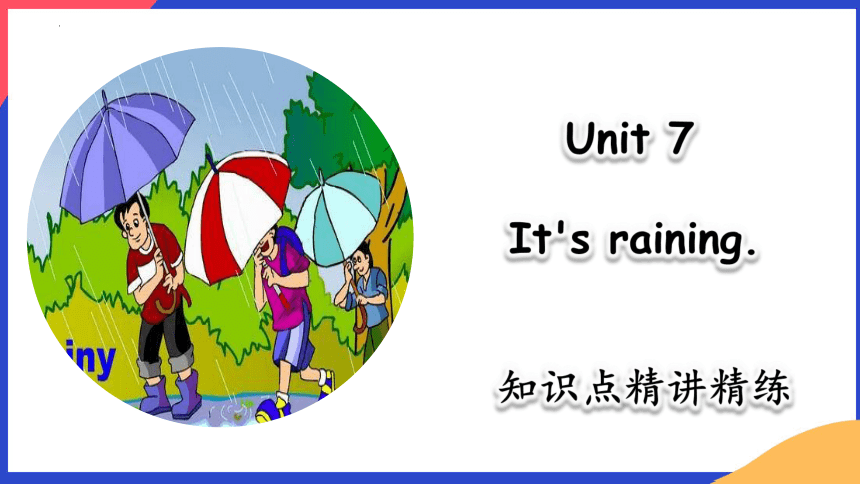 | |
| 格式 | pptx | ||
| 文件大小 | 539.5KB | ||
| 资源类型 | 试卷 | ||
| 版本资源 | 人教新目标(Go for it)版 | ||
| 科目 | 英语 | ||
| 更新时间 | 2024-04-18 12:16:02 | ||
图片预览

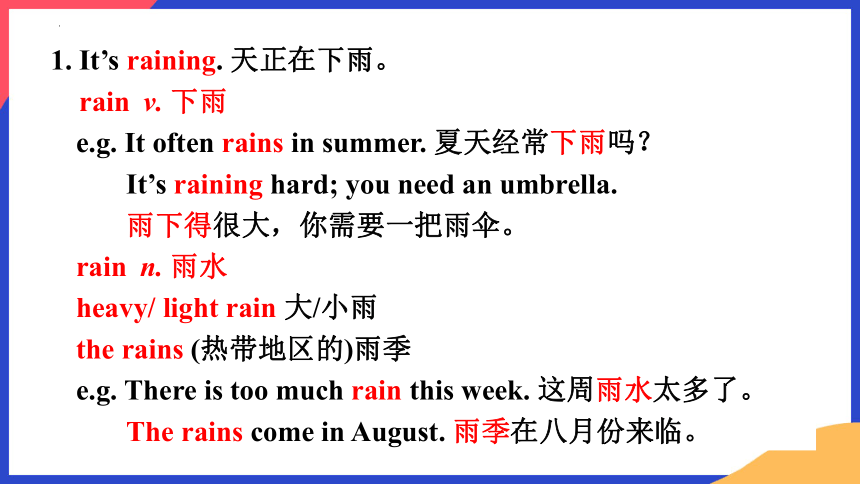
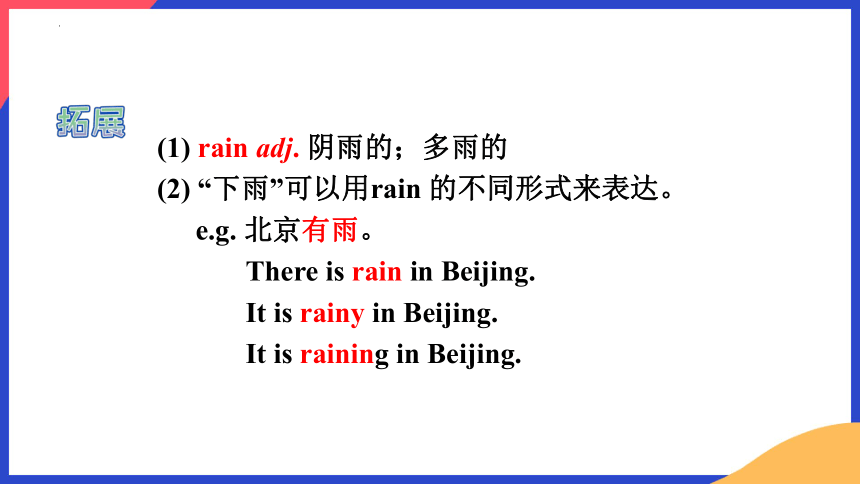
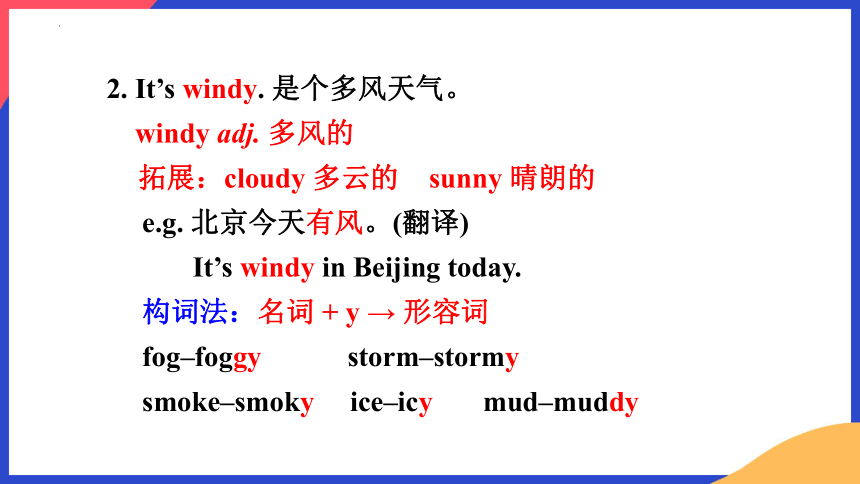
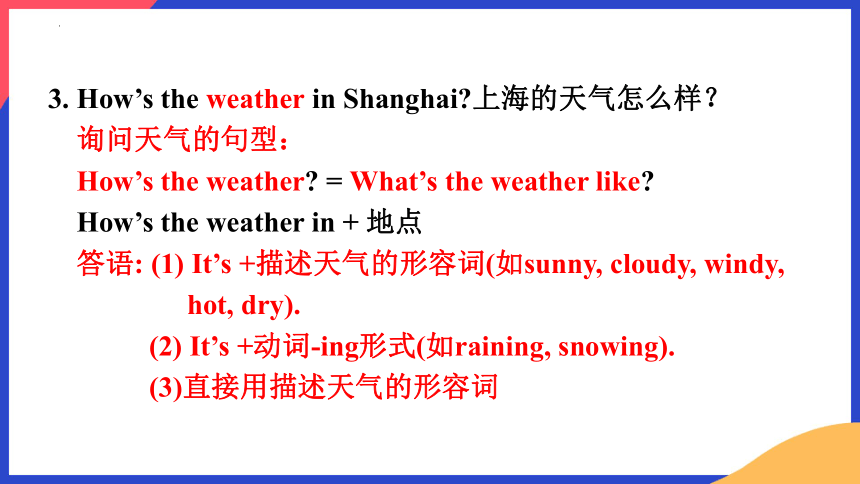
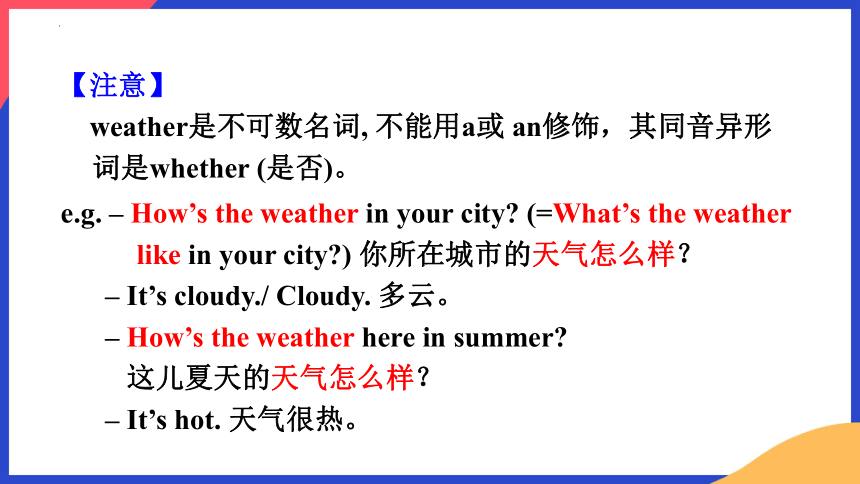
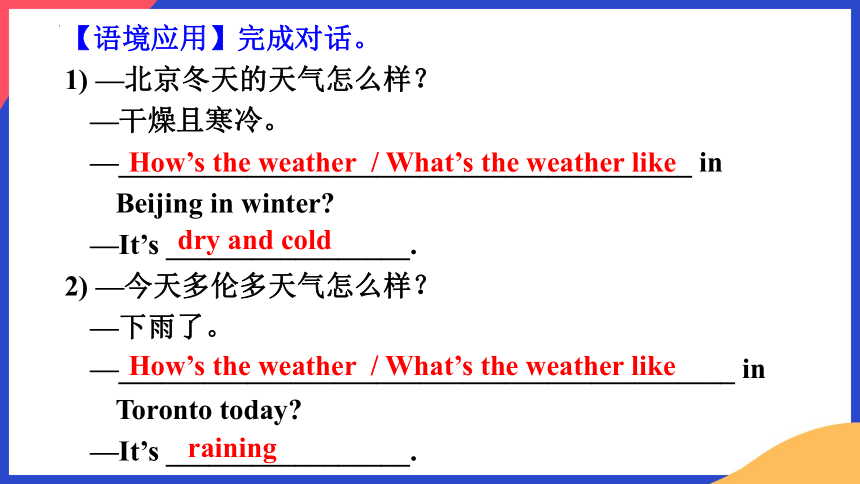
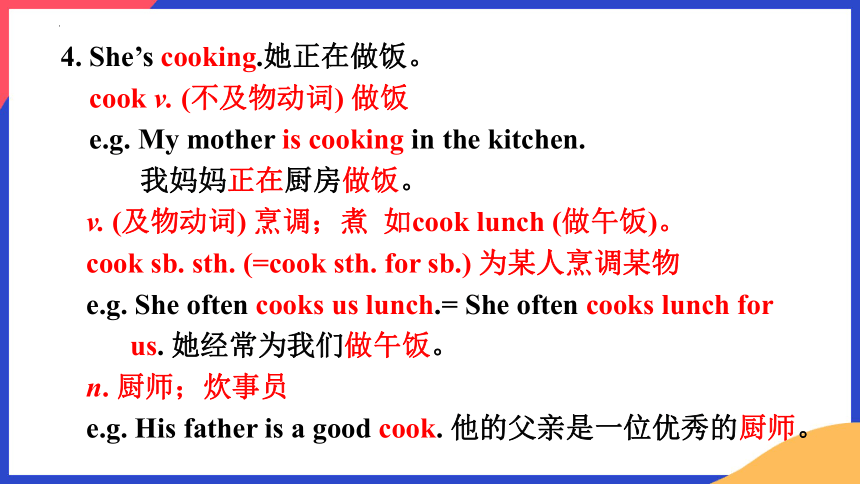
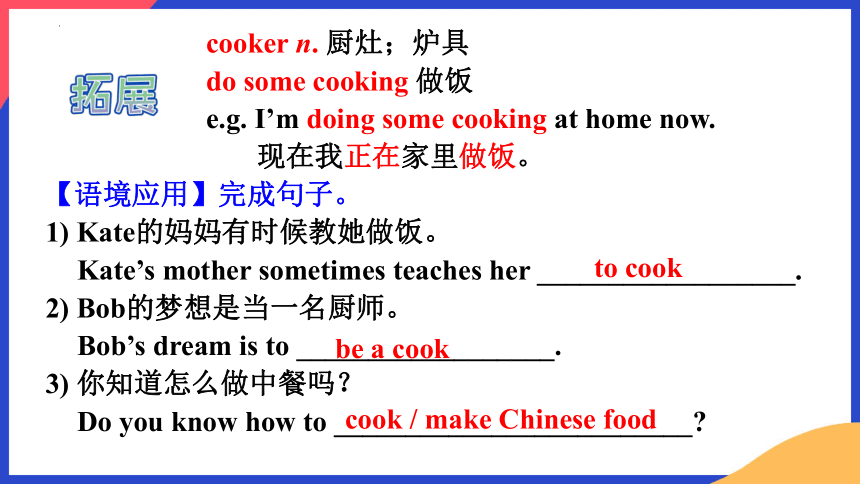

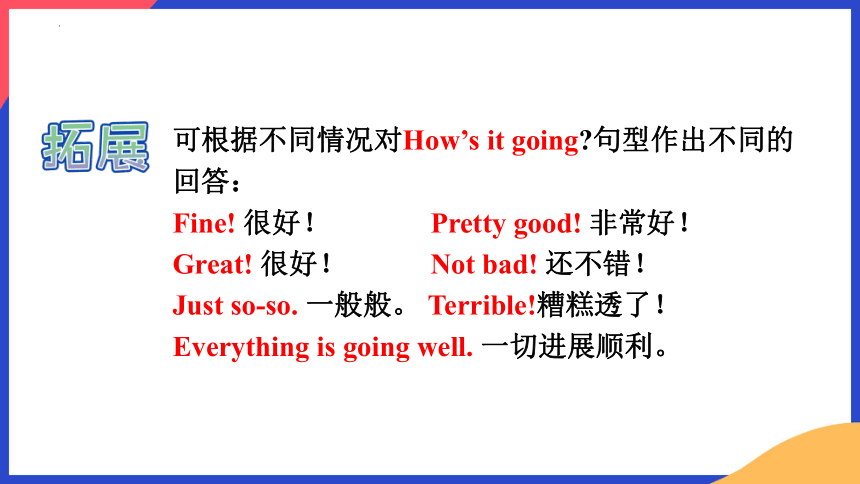
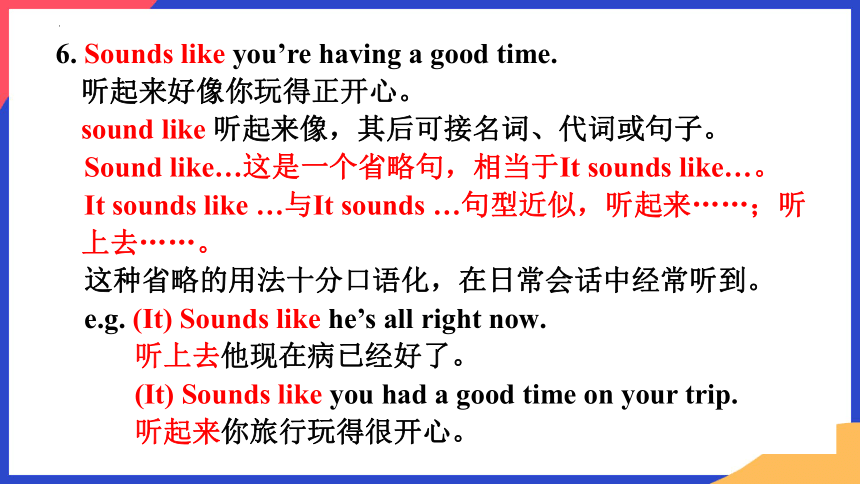
文档简介
(共40张PPT)
Unit 7
It's raining.
知识点精讲精练
1. It’s raining. 天正在下雨。
rain v. 下雨
e.g. It often rains in summer. 夏天经常下雨吗?
It’s raining hard; you need an umbrella.
雨下得很大,你需要一把雨伞。
rain n. 雨水
heavy/ light rain 大/小雨
the rains (热带地区的)雨季
e.g. There is too much rain this week. 这周雨水太多了。
The rains come in August. 雨季在八月份来临。
(1) rain adj. 阴雨的;多雨的
(2) “下雨”可以用rain 的不同形式来表达。
e.g. 北京有雨。
There is rain in Beijing.
It is rainy in Beijing.
It is raining in Beijing.
2. It’s windy. 是个多风天气。
windy adj. 多风的
拓展:cloudy 多云的 sunny 晴朗的
e.g. 北京今天有风。(翻译)
It’s windy in Beijing today.
构词法:名词 + y → 形容词
fog–foggy storm–stormy
smoke–smoky ice–icy mud–muddy
3. How’s the weather in Shanghai 上海的天气怎么样?
询问天气的句型:
How’s the weather = What’s the weather like
How’s the weather in + 地点
答语: (1) It’s +描述天气的形容词(如sunny, cloudy, windy, hot, dry).
(2) It’s +动词-ing形式(如raining, snowing).
(3)直接用描述天气的形容词
e.g. How’s the weather in your city (=What’s the weather like in your city ) 你所在城市的天气怎么样?
It’s cloudy./ Cloudy. 多云。
How’s the weather here in summer
这儿夏天的天气怎么样?
It’s hot. 天气很热。
【注意】
weather是不可数名词, 不能用a或 an修饰,其同音异形词是whether (是否)。
【语境应用】完成对话。
1) —北京冬天的天气怎么样?
—干燥且寒冷。
—________________________________________ in Beijing in winter
—It’s _________________.
2) —今天多伦多天气怎么样?
—下雨了。
—___________________________________________ in Toronto today
—It’s _________________.
How’s the weather / What’s the weather like
dry and cold
How’s the weather / What’s the weather like
raining
4. She’s cooking.她正在做饭。
cook v. (不及物动词) 做饭
e.g. My mother is cooking in the kitchen.
我妈妈正在厨房做饭。
v. (及物动词) 烹调;煮 如cook lunch (做午饭)。
cook sb. sth. (=cook sth. for sb.) 为某人烹调某物
e.g. She often cooks us lunch.= She often cooks lunch for us. 她经常为我们做午饭。
n. 厨师;炊事员
e.g. His father is a good cook. 他的父亲是一位优秀的厨师。
cooker n. 厨灶;炉具
do some cooking 做饭
e.g. I’m doing some cooking at home now.
现在我正在家里做饭。
【语境应用】完成句子。
1) Kate的妈妈有时候教她做饭。
Kate’s mother sometimes teaches her __________________.
2) Bob的梦想是当一名厨师。
Bob’s dream is to __________________.
3) 你知道怎么做中餐吗?
Do you know how to _________________________
to cook
be a cook
cook / make Chinese food
5. How’s it going 近来可好?
How’s … 询问对方情况。
这是口语中较常用的问候语,多用于朋友之间。回答时可根据不同的情况作答。如: Pretty good. / Great! / Not bad. / Terrible! 等。
e.g. —How’s it going
—Pretty good.
—最近怎么样?
—相当好。
可根据不同情况对How’s it going 句型作出不同的回答:
Fine! 很好! Pretty good! 非常好!
Great! 很好! Not bad! 还不错!
Just so-so. 一般般。 Terrible!糟糕透了!
Everything is going well. 一切进展顺利。
6. Sounds like you’re having a good time.
听起来好像你玩得正开心。
sound like 听起来像,其后可接名词、代词或句子。
Sound like…这是一个省略句,相当于It sounds like…。
It sounds like …与It sounds …句型近似,听起来……;听上去……。
这种省略的用法十分口语化,在日常会话中经常听到。
e.g. (It) Sounds like he’s all right now.
听上去他现在病已经好了。
(It) Sounds like you had a good time on your trip.
听起来你旅行玩得很开心。
【注意】
在英语中,类似于sound这样的感官动词(如look, feel, smell, taste等)后均可接介词like,然后再接宾语。
7. Can I take a message for him
要我给他捎个话吗?
message n. 信息;消息
take a message 捎个口信;传话
take a message for sb. 为某人捎个口信
give/ pass sb. a message 把口信捎给某人
send a message 发送消息
text message 短信
leave a message 留个口信
e.g. I’m sorry she’s out right now. can I take a message for you 对不起,她这会儿出去了。要我给你捎个口信吗?
Would you like to leave a message
你想留个口信吗?
I’ll give/ pass him the message.
我将把这个口信捎给他。
【语境应用】完成句子。
1) Helen出去了,要我捎个口信吗?
Helen is out. Can I _________________
2) 给你哥哥留个口信怎么样?
How about ____________________ your brother
take a message
leaving a message for
8. Could you just tell him to call me back
你能叫他给我回个电话吗?
Could you… 你能……吗?
用于委婉地提出请求,could在语气上比can更委婉、客气。其肯定答语常为:Sure./ Certainly./ Of course./ With
pleasure.(乐意效劳)/ No problem.(没问题)/ Sure, I’d love to.(当然可以,我很乐意)
其否定答语为: Sorry, I can’t. (对不起,我不能。我……)
tell sb. to do sth. =ask sb. to do sth.叫某人做某事
tell sb. not to do sth.让某人不要做某事
e.g. Our teachers tell us to get to school on time.
我们老师告诉我们要按时到校。
Tell the children not to make too much noise.
告诉孩子们不要制造太多噪音。
【语境应用】完成句子。
1) Mr. Zhou叫我们在学校留短发。
Mr. Zhou __________ _______ _______ _______ our hair short at school.
2) 不要告诉他们我的电话号码。
Don’t ______ ______ ______ _________________ ______.
3) 你能不能帮我打扫房子?
_____________ ______ ______ ______ clean the house
tells / asks us to keep
tell them my telephone / phone number
Could / Can you help me
. How’s it going 一切可好?近来怎样?
打招呼或问候对方的常用寒暄语。 还有:
How are things with you
How are you doing
How’s everything
How are you getting on
回答是表示状况的形容词, 如:
Great! / Pretty good!/Not bad./Terrible!等。
1. I’m having a great time visiting my aunt in Canada.
我正在加拿大探望我姑姑,过得十分惬意。
have a great / good time 玩得高兴
have a great / good time (in) doing sth. 愉快地做某事相当于have fun (in) doing sth.
e.g. I have a good / great time / have fun living with my
pet dog.
我和我的宠物狗住在一起很高兴。
【语境应用】用所给词的适当形式填空。
Look! My family are having a great time _______ (play) games in the garden.
playing
visit v. 拜访;参观;游览
后可接表示人的名词或代词,也可接表示地点的名词。
e.g. I visit my grandparents every year during the Spring Festival.我每年在春节期间去看望我的祖父母。
I want to visit the Great Wall. 我想要游览长城。
visit n. 访问;参观;拜访。
pay a visit to 参观;探望
be on a visit to 参观;探望
e.g. I often pay a visit to my history teacher.
我经常探望我的历史老师。
This is my first visit to the Great Wall.
这是我第一次游览长城。
visitor n. 参观者
【语境应用】根据所给单词的提示填空。
1) We’re having a good time _______(live) in this village.
2) It’s my first _______(visit) to the USA.
3) Alan _______(visit) his grandparents every weekend.
4) There are a lot of _______(visit) from China.
living
visit
visits
visitors
2. I’m also visiting some of my old friends.
我还要拜访一些我的老友。
some of… ……中的一些
表示不确定的量,of后接可数名词复数、不可数名词或宾格代词;of后接名词时,名词前通常有定冠词、指示代词或形容词性物主代词修饰。
e.g. Some of the water is not clean. 一些水是不干净的。
Some of the children are having fun in the park.
一些孩子在公园里玩得正开心。
注意:
some of…作主语时,谓语动词的单复数形式和of后面的名词或宾格代词的单复数保持一致。类似用法的短语还有most of…, all of…, lots of…等。
3. I’m so happy to see them again.
真高兴与他们再次相见。
be happy to do sth. 高兴做某事
是 “be +adj. + to do sth.”结构。
e.g. He is happy to study in China. 他很高兴在中国学习。
The villagers are happy to have a bridge over the river.
村民们很高兴河上有一座桥。
be happy with sth. 对某事/某物感到满意
e.g. The young man is not happy with the weather in London.
这个年轻人对伦敦的天气不满意。
be happy + that从句 高兴……
e.g. He is very happy that his daughter practices the piano well. 他很高兴他女儿的钢琴练得好。
4. I’m sitting by the pool and drinking orange juice.
我正坐在泳池边喝着橙汁。
sit vi. 坐 现在分词是sitting。
sit down 坐下
e.g. Please sit on the chair and have some tea.
请坐在椅子上,喝杯茶。
by prep.
(1) 在……旁边,位置比 near 更近。
e.g. There is a big tree by the river.
河边有一棵大树。
Do you live near your school
你住在学校附近吗?
(2) 通过,使用 表示用某种方法或手段。
e.g. He makes a living by teaching. 他靠教学谋生。
(3) 在……之前 表示时间。
e.g. We can finish the work by noon.
我们能在中午之前完成这项工作。
(4) 乘坐(交通工具)
交通工具用单数形式,且其前不能用冠词、形容词性物主代词等限定成分。
e.g. I usually go to school by bike.
我通常骑自行车去上学。
by the way 顺便说一下,顺便问一下
e.g. By the way, when will you come back
顺便问一下,你什么时候回来?
by oneself 独自地
e.g. I learn Japanese by myself. 我独自学日语。
Vincent sometimes sits ______ the river and listens to music.
A. On B. by C. over D. under
B
5. Are you studying hard, or are you having fun
你现在正刻苦学习还是高兴玩耍?
hard adv. 努力地;辛苦地
e.g. You can learn a lot only by working hard.
只能通过努力学习你才能学到很多(知识)。
hard adv. 大量地;沉重地 此时相当于heavily。
e.g. It’s raining hard. 雨下得很大。
根据首字母提示,写出下面句子中单词的完全形式。
You’d better stay indoors as it’s raining h____________.
hard/ heavily
hard adj. 坚硬的;困难的
e.g. The stone is too hard. 这块石头太硬了。
That’s a hard question. 那是个很难的问题。
6. My family and I are on a vacation in the mountains.
我跟我们全家在山里度假。
on (a) vacation 度假
相当于on (a) holiday,介词on表示活动的状态。
go on a vacation 去度假
e.g. Mr. Green is on a vacation in Europe.
格林先生正在欧洲度假。
I want to go on a vacation. 我想去度假。
vacation的常见短语
summer/ winter vacation 暑/ 寒假
take a vacation 度假
vacation 假期 指放下工作或学习的一段较长的休息时间,通常可用holiday替换。
holiday 假日,休息日 主要指风俗习惯或法律规定的纪念日或休息日。在英式英语中,其复数形式可表示延续一段时间的“假期”,美式英语则习惯用单数。
vacation与holiday
7. I want to call you but my phone isn’t working, so I’m writing to you.
我想给你打电话,但我的电话不好用,所以我就给你写明信片了。
call v. (给……) 打电话
call sb. 给某人打电话
call sb. at+ 电话号码 拨打……号码找某人
e.g. Please call the police at 110. 请拨打110报警。
call n. 打电话;通话
e.g. He has to give a call to his mother for money.
他不得不为钱而给他的妈妈打电话。
【语境应用】将下面的汉语句子翻译成英语。
1) 拨打电话635 6652找海伦(Helen)。
________________________________________________2) 请给托尼(Tony)打个电话。
________________________________________________
Please call Tony / Please give Tony a call.
Call Helen at 635 6652.
write to sb. 给某人写信
相当于write a letter to sb., 其相对短语为hear from sb. 或get a letter from sb.,“收到某人的来信”。
e.g. Please write to me soon. 请尽快给我写信。
I often hear from my pen pal.
我经常收到我笔友的来信。
write back to sb. 给某人写回信
e.g. I write back to him to thank him for the invitation.
我给他写回信以感谢他的邀请。
Unit 7
It's raining.
知识点精讲精练
1. It’s raining. 天正在下雨。
rain v. 下雨
e.g. It often rains in summer. 夏天经常下雨吗?
It’s raining hard; you need an umbrella.
雨下得很大,你需要一把雨伞。
rain n. 雨水
heavy/ light rain 大/小雨
the rains (热带地区的)雨季
e.g. There is too much rain this week. 这周雨水太多了。
The rains come in August. 雨季在八月份来临。
(1) rain adj. 阴雨的;多雨的
(2) “下雨”可以用rain 的不同形式来表达。
e.g. 北京有雨。
There is rain in Beijing.
It is rainy in Beijing.
It is raining in Beijing.
2. It’s windy. 是个多风天气。
windy adj. 多风的
拓展:cloudy 多云的 sunny 晴朗的
e.g. 北京今天有风。(翻译)
It’s windy in Beijing today.
构词法:名词 + y → 形容词
fog–foggy storm–stormy
smoke–smoky ice–icy mud–muddy
3. How’s the weather in Shanghai 上海的天气怎么样?
询问天气的句型:
How’s the weather = What’s the weather like
How’s the weather in + 地点
答语: (1) It’s +描述天气的形容词(如sunny, cloudy, windy, hot, dry).
(2) It’s +动词-ing形式(如raining, snowing).
(3)直接用描述天气的形容词
e.g. How’s the weather in your city (=What’s the weather like in your city ) 你所在城市的天气怎么样?
It’s cloudy./ Cloudy. 多云。
How’s the weather here in summer
这儿夏天的天气怎么样?
It’s hot. 天气很热。
【注意】
weather是不可数名词, 不能用a或 an修饰,其同音异形词是whether (是否)。
【语境应用】完成对话。
1) —北京冬天的天气怎么样?
—干燥且寒冷。
—________________________________________ in Beijing in winter
—It’s _________________.
2) —今天多伦多天气怎么样?
—下雨了。
—___________________________________________ in Toronto today
—It’s _________________.
How’s the weather / What’s the weather like
dry and cold
How’s the weather / What’s the weather like
raining
4. She’s cooking.她正在做饭。
cook v. (不及物动词) 做饭
e.g. My mother is cooking in the kitchen.
我妈妈正在厨房做饭。
v. (及物动词) 烹调;煮 如cook lunch (做午饭)。
cook sb. sth. (=cook sth. for sb.) 为某人烹调某物
e.g. She often cooks us lunch.= She often cooks lunch for us. 她经常为我们做午饭。
n. 厨师;炊事员
e.g. His father is a good cook. 他的父亲是一位优秀的厨师。
cooker n. 厨灶;炉具
do some cooking 做饭
e.g. I’m doing some cooking at home now.
现在我正在家里做饭。
【语境应用】完成句子。
1) Kate的妈妈有时候教她做饭。
Kate’s mother sometimes teaches her __________________.
2) Bob的梦想是当一名厨师。
Bob’s dream is to __________________.
3) 你知道怎么做中餐吗?
Do you know how to _________________________
to cook
be a cook
cook / make Chinese food
5. How’s it going 近来可好?
How’s … 询问对方情况。
这是口语中较常用的问候语,多用于朋友之间。回答时可根据不同的情况作答。如: Pretty good. / Great! / Not bad. / Terrible! 等。
e.g. —How’s it going
—Pretty good.
—最近怎么样?
—相当好。
可根据不同情况对How’s it going 句型作出不同的回答:
Fine! 很好! Pretty good! 非常好!
Great! 很好! Not bad! 还不错!
Just so-so. 一般般。 Terrible!糟糕透了!
Everything is going well. 一切进展顺利。
6. Sounds like you’re having a good time.
听起来好像你玩得正开心。
sound like 听起来像,其后可接名词、代词或句子。
Sound like…这是一个省略句,相当于It sounds like…。
It sounds like …与It sounds …句型近似,听起来……;听上去……。
这种省略的用法十分口语化,在日常会话中经常听到。
e.g. (It) Sounds like he’s all right now.
听上去他现在病已经好了。
(It) Sounds like you had a good time on your trip.
听起来你旅行玩得很开心。
【注意】
在英语中,类似于sound这样的感官动词(如look, feel, smell, taste等)后均可接介词like,然后再接宾语。
7. Can I take a message for him
要我给他捎个话吗?
message n. 信息;消息
take a message 捎个口信;传话
take a message for sb. 为某人捎个口信
give/ pass sb. a message 把口信捎给某人
send a message 发送消息
text message 短信
leave a message 留个口信
e.g. I’m sorry she’s out right now. can I take a message for you 对不起,她这会儿出去了。要我给你捎个口信吗?
Would you like to leave a message
你想留个口信吗?
I’ll give/ pass him the message.
我将把这个口信捎给他。
【语境应用】完成句子。
1) Helen出去了,要我捎个口信吗?
Helen is out. Can I _________________
2) 给你哥哥留个口信怎么样?
How about ____________________ your brother
take a message
leaving a message for
8. Could you just tell him to call me back
你能叫他给我回个电话吗?
Could you… 你能……吗?
用于委婉地提出请求,could在语气上比can更委婉、客气。其肯定答语常为:Sure./ Certainly./ Of course./ With
pleasure.(乐意效劳)/ No problem.(没问题)/ Sure, I’d love to.(当然可以,我很乐意)
其否定答语为: Sorry, I can’t. (对不起,我不能。我……)
tell sb. to do sth. =ask sb. to do sth.叫某人做某事
tell sb. not to do sth.让某人不要做某事
e.g. Our teachers tell us to get to school on time.
我们老师告诉我们要按时到校。
Tell the children not to make too much noise.
告诉孩子们不要制造太多噪音。
【语境应用】完成句子。
1) Mr. Zhou叫我们在学校留短发。
Mr. Zhou __________ _______ _______ _______ our hair short at school.
2) 不要告诉他们我的电话号码。
Don’t ______ ______ ______ _________________ ______.
3) 你能不能帮我打扫房子?
_____________ ______ ______ ______ clean the house
tells / asks us to keep
tell them my telephone / phone number
Could / Can you help me
. How’s it going 一切可好?近来怎样?
打招呼或问候对方的常用寒暄语。 还有:
How are things with you
How are you doing
How’s everything
How are you getting on
回答是表示状况的形容词, 如:
Great! / Pretty good!/Not bad./Terrible!等。
1. I’m having a great time visiting my aunt in Canada.
我正在加拿大探望我姑姑,过得十分惬意。
have a great / good time 玩得高兴
have a great / good time (in) doing sth. 愉快地做某事相当于have fun (in) doing sth.
e.g. I have a good / great time / have fun living with my
pet dog.
我和我的宠物狗住在一起很高兴。
【语境应用】用所给词的适当形式填空。
Look! My family are having a great time _______ (play) games in the garden.
playing
visit v. 拜访;参观;游览
后可接表示人的名词或代词,也可接表示地点的名词。
e.g. I visit my grandparents every year during the Spring Festival.我每年在春节期间去看望我的祖父母。
I want to visit the Great Wall. 我想要游览长城。
visit n. 访问;参观;拜访。
pay a visit to 参观;探望
be on a visit to 参观;探望
e.g. I often pay a visit to my history teacher.
我经常探望我的历史老师。
This is my first visit to the Great Wall.
这是我第一次游览长城。
visitor n. 参观者
【语境应用】根据所给单词的提示填空。
1) We’re having a good time _______(live) in this village.
2) It’s my first _______(visit) to the USA.
3) Alan _______(visit) his grandparents every weekend.
4) There are a lot of _______(visit) from China.
living
visit
visits
visitors
2. I’m also visiting some of my old friends.
我还要拜访一些我的老友。
some of… ……中的一些
表示不确定的量,of后接可数名词复数、不可数名词或宾格代词;of后接名词时,名词前通常有定冠词、指示代词或形容词性物主代词修饰。
e.g. Some of the water is not clean. 一些水是不干净的。
Some of the children are having fun in the park.
一些孩子在公园里玩得正开心。
注意:
some of…作主语时,谓语动词的单复数形式和of后面的名词或宾格代词的单复数保持一致。类似用法的短语还有most of…, all of…, lots of…等。
3. I’m so happy to see them again.
真高兴与他们再次相见。
be happy to do sth. 高兴做某事
是 “be +adj. + to do sth.”结构。
e.g. He is happy to study in China. 他很高兴在中国学习。
The villagers are happy to have a bridge over the river.
村民们很高兴河上有一座桥。
be happy with sth. 对某事/某物感到满意
e.g. The young man is not happy with the weather in London.
这个年轻人对伦敦的天气不满意。
be happy + that从句 高兴……
e.g. He is very happy that his daughter practices the piano well. 他很高兴他女儿的钢琴练得好。
4. I’m sitting by the pool and drinking orange juice.
我正坐在泳池边喝着橙汁。
sit vi. 坐 现在分词是sitting。
sit down 坐下
e.g. Please sit on the chair and have some tea.
请坐在椅子上,喝杯茶。
by prep.
(1) 在……旁边,位置比 near 更近。
e.g. There is a big tree by the river.
河边有一棵大树。
Do you live near your school
你住在学校附近吗?
(2) 通过,使用 表示用某种方法或手段。
e.g. He makes a living by teaching. 他靠教学谋生。
(3) 在……之前 表示时间。
e.g. We can finish the work by noon.
我们能在中午之前完成这项工作。
(4) 乘坐(交通工具)
交通工具用单数形式,且其前不能用冠词、形容词性物主代词等限定成分。
e.g. I usually go to school by bike.
我通常骑自行车去上学。
by the way 顺便说一下,顺便问一下
e.g. By the way, when will you come back
顺便问一下,你什么时候回来?
by oneself 独自地
e.g. I learn Japanese by myself. 我独自学日语。
Vincent sometimes sits ______ the river and listens to music.
A. On B. by C. over D. under
B
5. Are you studying hard, or are you having fun
你现在正刻苦学习还是高兴玩耍?
hard adv. 努力地;辛苦地
e.g. You can learn a lot only by working hard.
只能通过努力学习你才能学到很多(知识)。
hard adv. 大量地;沉重地 此时相当于heavily。
e.g. It’s raining hard. 雨下得很大。
根据首字母提示,写出下面句子中单词的完全形式。
You’d better stay indoors as it’s raining h____________.
hard/ heavily
hard adj. 坚硬的;困难的
e.g. The stone is too hard. 这块石头太硬了。
That’s a hard question. 那是个很难的问题。
6. My family and I are on a vacation in the mountains.
我跟我们全家在山里度假。
on (a) vacation 度假
相当于on (a) holiday,介词on表示活动的状态。
go on a vacation 去度假
e.g. Mr. Green is on a vacation in Europe.
格林先生正在欧洲度假。
I want to go on a vacation. 我想去度假。
vacation的常见短语
summer/ winter vacation 暑/ 寒假
take a vacation 度假
vacation 假期 指放下工作或学习的一段较长的休息时间,通常可用holiday替换。
holiday 假日,休息日 主要指风俗习惯或法律规定的纪念日或休息日。在英式英语中,其复数形式可表示延续一段时间的“假期”,美式英语则习惯用单数。
vacation与holiday
7. I want to call you but my phone isn’t working, so I’m writing to you.
我想给你打电话,但我的电话不好用,所以我就给你写明信片了。
call v. (给……) 打电话
call sb. 给某人打电话
call sb. at+ 电话号码 拨打……号码找某人
e.g. Please call the police at 110. 请拨打110报警。
call n. 打电话;通话
e.g. He has to give a call to his mother for money.
他不得不为钱而给他的妈妈打电话。
【语境应用】将下面的汉语句子翻译成英语。
1) 拨打电话635 6652找海伦(Helen)。
________________________________________________2) 请给托尼(Tony)打个电话。
________________________________________________
Please call Tony / Please give Tony a call.
Call Helen at 635 6652.
write to sb. 给某人写信
相当于write a letter to sb., 其相对短语为hear from sb. 或get a letter from sb.,“收到某人的来信”。
e.g. Please write to me soon. 请尽快给我写信。
I often hear from my pen pal.
我经常收到我笔友的来信。
write back to sb. 给某人写回信
e.g. I write back to him to thank him for the invitation.
我给他写回信以感谢他的邀请。
同课章节目录
- Unit 1 Can you play the guitar?
- Section A
- Section B
- Unit 2 What time do you go to school?
- Section A
- Section B
- Unit 3 How do you get to school?
- Section A
- Section B
- Unit 4 Don't eat in class.
- Section A
- Section B
- Unit 5 Why do you like pandas?
- Section A
- Section B
- Unit 6 I'm watching TV.
- Section A
- Section B
- Review of Units 1-6
- Unit 7 It's raining!
- Section A
- Section B
- Unit 8 Is there a post office near here?
- Section A
- Section B
- Unit 9 What does he look like?
- Section A
- Section B
- Unit 10 I'd like some noodles.
- Section A
- Section B
- Unit 11 How was your school trip?
- Section A
- Section B
- Unit 12 What did you do last weekend?
- Section A
- Section B
